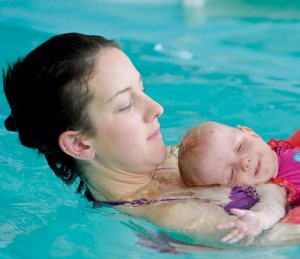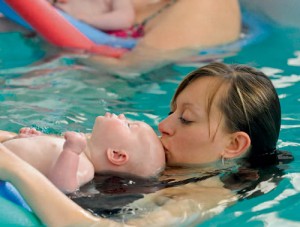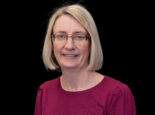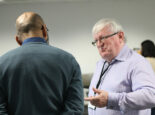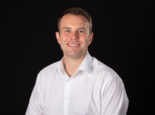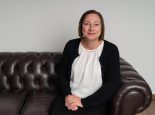Alison Duff – Calmababy
What was it that prompted the change of career direction after Barclays?
When I came back from Australia I got a job with Thomas Cook, and then worked my way up through different roles to eventually being the Commercial and Editing Manager for teletext. Then I was enticed away from there by Barclays, because when I was in Australia I worked in a bank. I was only at Barclays a very short time – a couple of years – in the investigations department for the misselling of investment products. And it just wasn’t what I wanted to do at all. I didn’t want to get up every day and go to work. And I knew that I wanted a job that was more a way of life than a job. Eventually I wanted to have a baby, I knew that, but I also wanted a job that would encompass a family life and – although it sounds cheesy – which made a difference to people. I didn’t know what it was at the time, until I stumbled across baby massage. A friend of mine had a baby that was suffering with colic, and because I was already a masseuse she asked me if I knew anything about it. I didn’t, but I looked into it and immediately was very drawn to it, and found out that I couldn’t massage the babies but that I could teach the parents to do it. And it all started from there.
In what ways does calmababy make a difference?
Aside from the programme of research-based progressive classes we offer a non-judgemental, supportive and relaxed space for parents to gather, socialise and spend time with their children. We also offer services for free. Obviously we are a business and we have staff to pay, and bills to pay – the heating bill is rather large because the pool’s at 34 degrees – but what’s really important is that we are accessible. Because that link to colic is where we started, we have a service where anyone can come with a baby who is suffering from any kind of tummy troubles, or crying, or problems getting settled, and we see them free, with sessions where we can show the parents techniques like massage and yoga. Selina’s Tearoom and both play areas are free of charge. Anyone with a baby or child can come and use the space without paying to enter. They do not have to be booked into Calmababy classes to use Selina’s. We also keep our other prices as low as we can to make it accessible to everybody. And we don’t do anything that isn’t in the interests of the baby. That’s really vitally important to us. What we don’t do is tell people how to raise their children. We just keep ourselves educated in current research and practices, and teach from the point of view that the
parent is the expert and let them choose what’s right for their baby.
Doing things for free and keeping prices low is the antithesis of What many Businesses are about. how does that work for you?
Some people have never heard of us until they Google for “my baby has colic” or a friend tells them about the cake, then they come here for the free classes or for lunch with a friend and keep coming back. They might never enrol into any workshops or classes, but they come and use the tea room and they get support and build up that network where everyone’s in the same boat with children. A lot of people come once a week, and do a class and then maybe stay and have some cake, or some lunch. A few people come two or three times a week, or might just come for lunch one day to meet friends. And then we have people that stay all day – who literally get dropped off by their husbands on his way to work – they’ll have some breakfast, maybe do a class in the morning, maybe have some lunch, do a little float in the afternoon, have some afternoon tea and then get picked up at the end of the day. It’s just this very relaxed atmosphere in which you can do what suits you and your child. What people like is we truly love babies and children here. A lot of people have said that the reason they love coming to Selina’s Tea Room, for example, is that they feel that children can be children here. You don’t feel like you have to keep them at the table. They roam about, having fun and enjoying the play areas, and it’s a very relaxed place.
Did you have trouble convincing the bank, given the uniqueness of this centre?
Not really, because we are pretty much self-funded. We do have a small loan, but the good thing was that I had taught for ten years previously, hiring different places, so there was information there for the bank to look at. Some people used to think I was a little bit crazy… But when they come and see it, they realise it is a fantastic business model that could work anywhere. And the great thing about it is
that babies are born every second, so there’s a regeneration of the customer base!
Was it hard getting the message to potential customers?
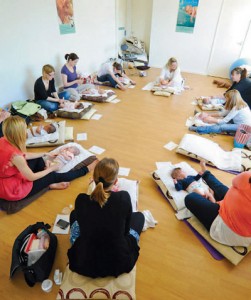 No, it wasn’t – and I think that’s because I’d been doing teaching for ten years previously. And I did market research, speaking to all the people who attended the classes, saying “What about if we had a centre where all these things could happen under one roof?” And they all said they would come. To put it into perspective, we predicted that we would open with about 60 per cent capacity, which meant about 18 classes a week for swimming, and get up to about 34 classes over three years. But we opened with 37 classes, so we exceeded all expectations from the day we opened. And we now run 110 classes a week. We could never have predicted how popular it would be. There was a time when we’d put so much money into building the pool, and so much time promoting the pool, that people began to think we were just a baby swimming pool, so we had to shift perception a bit. But
No, it wasn’t – and I think that’s because I’d been doing teaching for ten years previously. And I did market research, speaking to all the people who attended the classes, saying “What about if we had a centre where all these things could happen under one roof?” And they all said they would come. To put it into perspective, we predicted that we would open with about 60 per cent capacity, which meant about 18 classes a week for swimming, and get up to about 34 classes over three years. But we opened with 37 classes, so we exceeded all expectations from the day we opened. And we now run 110 classes a week. We could never have predicted how popular it would be. There was a time when we’d put so much money into building the pool, and so much time promoting the pool, that people began to think we were just a baby swimming pool, so we had to shift perception a bit. But
we’re now starting to focus more on the pregnancy and dry classes.
The business seems not to have been hit by the recession at all. Why is that?
I think it’s because parents are always interested in the wellbeing of their children and giving them the best they can, regardless of circumstances. I did find that a few years ago parents were doing massage, and baby yoga, and baby swimming, and perhaps would be doing other classes around Peterborough too – music, singing and so on. I think now maybe they don’t do as many, and are a bit more selective about doing maybe one thing that’s really important. And it seems to be that swimming is the first choice, because it gives them skills for life but also has great benefits – sleeping better, improved eating patterns, and just general development. I think people do look inwardly more during recession, and make decisions about what’s really important to them.
How did you become part of the Goldman Sachs 10,000 small businesses programme?
The programme is by competitive selection was first alerted to it by a lady from the Department of Small Business, who was actually a customer here. She said that we had such a great business model that I would probably be eligible. So, I had a look at it and decided I was definitely going to apply. It felt like the programme was going to fill in the gaps, for me. When I first opened the centre two and a half years ago, this was going to be a place that I’d teach my classes with the help of another teacher, but it very quickly became obvious that it was so much more than that. So, really, the business grew in the first couple of years on determination, passion – not really on business acuman, if I’m honest! What I needed was a training programme to give me the stuff that I didn’t have, to take the business to the next level. And that’s exactly what it’s given me.



